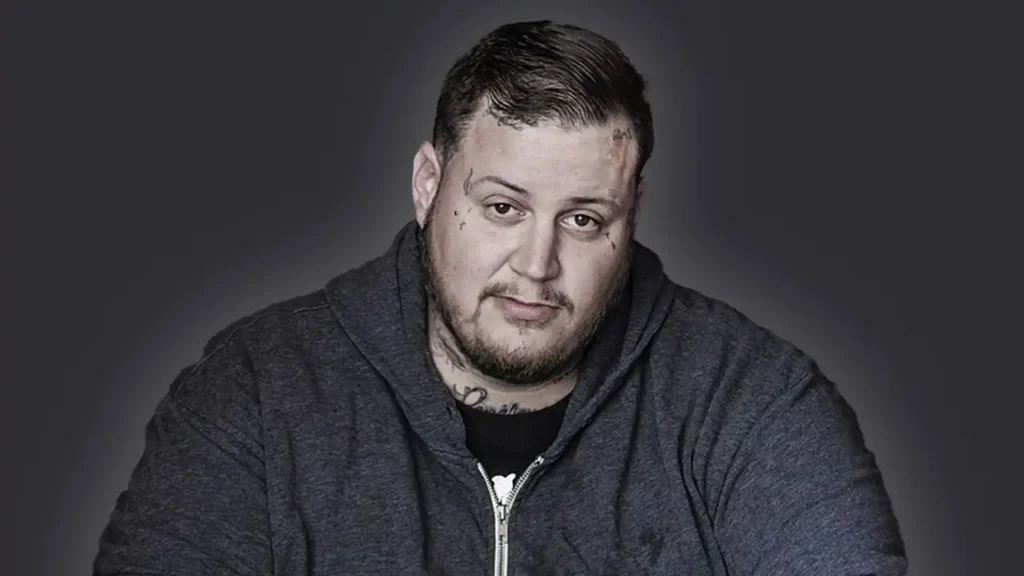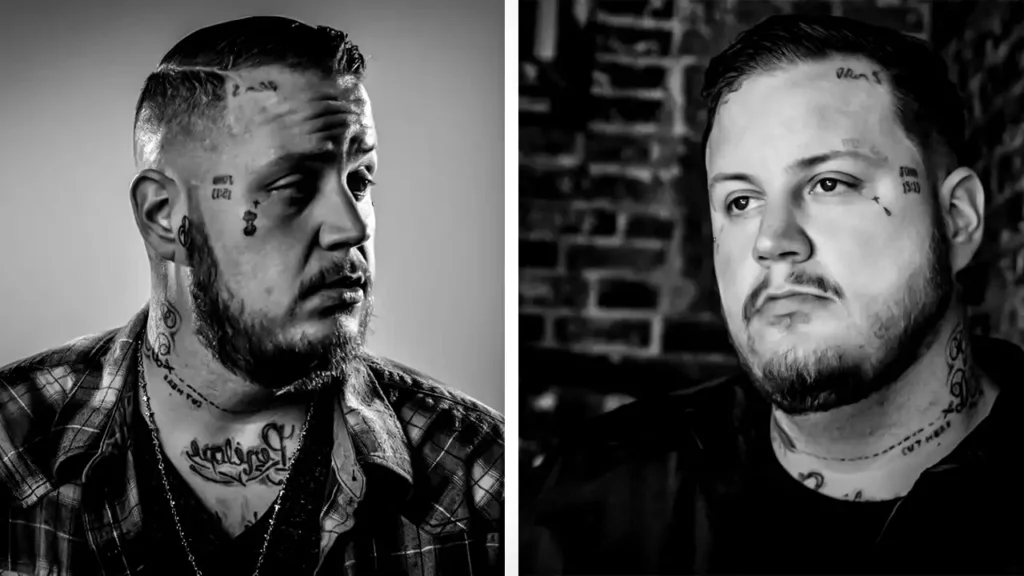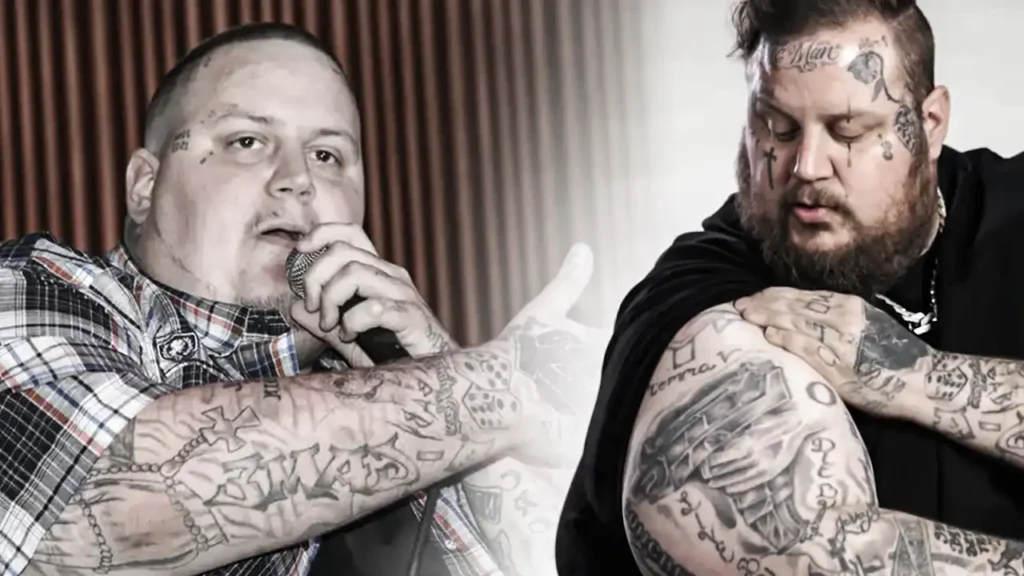Jelly Roll‘s early years were anything but easy. Raised in the rural outskirts of Nashville, Tennessee, he grew up surrounded by hardship and limited opportunities. With a mother battling addiction and a father trying to make ends meet through illegal means, Jelly Roll’s childhood was marked by poverty and instability. Despite these challenges, he managed to carve a path to success, turning his tumultuous past into a powerful force for his music and life.

Starting with Struggles
Some people’s early lives make it easy for them to be successful, while others face many challenges that make it harder to have a stable life. Jelly Roll did not grow up with the advantages many Americans have. Because of his upbringing, he felt he had few choices when he was young. Jelly Roll was raised in Antioch, a rural area outside of Nashville, Tennessee where there were limited opportunities.
“I just remember everyone doing drugs. I was in my 20s before I realized that having a drug addict in your family wasn’t normal,” Jelly explained, talking about his mother’s addiction. “We barely had enough to get by, and sadly, barely getting by was better than most others. I don’t remember anyone with real money.”
Jelly’s father worked selling meat and running an illegal gambling business on the side. But the income was not enough to provide for Jelly and his three older half-siblings. In an interview, Jelly said he didn’t realize how poor he was until later, even calling his childhood home a “shack.” Seeing those around him struggling to make ends meet, even through illegal activities, made Jelly feel like crime was his only way to survive. “I knew my father took bets illegally. I knew my mother struggled with drugs. So, to me, this was just what you did,” he told CBS News.

Taking Responsibility After His Parents’ Divorce
Jelly Roll’s dad was married five or six times – even Jelly isn’t sure of the exact number. So when his parents divorced when he was 13 years old, it probably wasn’t too surprising. Jelly stayed with his mom after the divorce, and he quickly had to take on the role of providing for the family. “I felt like I needed to take care of my mother back then,” he said. “When my dad left, I thought, ‘Somebody has to do what he was doing to earn money.'”
This need for money is what first led Jelly into a life of crime, starting with selling drugs. Drugs were always present in Jelly’s life, as he witnessed his mother using drugs and struggling with mental health issues when he was a young child. This is also what led Jelly to find an outlet in music.
“What got me into music was my mother. My mother had extreme mental health problems and a drug addiction, and she would never come out of her room,” he recalled. But when she did come out, his mom would play music really loud, which drew people’s attention. “Something changed in her when music played…so I spent my whole life writing songs for her.”

Forced to Break the Law
Jelly Roll’s father sold meat and took illegal bets for gambling. Growing up around that, Jelly felt he had few options for his future life. He wanted to be the one making money, not wasting it on drugs like others around him. This led Jelly to sell cocaine as a way to get by, even though they barely had enough.
This mindset put Jelly in and out of juvenile detention centers and jails as a teenager, starting at just 14 years old, mostly for drug and robbery charges. In 2023, he visited one of the jail cells he was locked up in and broke down crying, saying he truly thought that was going to be his life.
Jelly Roll started experimenting with marijuana very young, getting arrested for possession at 13. By 15, he had tried many other drugs like cocaine, pills, acid and meth. His early drug use, combined with his mom’s addiction and drug issues in his community, caused him to become addicted to drugs himself.
Many of his songs, like “Save Me,” talk about the darkness he went through with drugs. He sees himself as a “broken man” trying to get better, and his music gives a voice to those struggling. Though he references drinking and smoking in songs, his main issues were with cocaine, painkillers and codeine, which controlled his life for a long time. He no longer uses those, but still drinks alcohol and smokes marijuana occasionally.
Tragic Stories Behind Jelly Roll Tattoos
Tattoos can be beautiful art that has personal meaning. But if they are done poorly, there’s a chance you may regret them and have to go through the painful process of getting them removed. For someone like Jelly Roll, who is covered in tattoos, removal may not be an easy option. In an interview with GQ, Jelly Roll was honest about his tattoos – he said he hated most of them.

“I regret 98% of these tattoos. 97%. Almost all of them,” he said. “Like, ideas I really believed in when I was 17, but now I’m 40 and I think ‘What was I thinking?'” While some, like the smoking baby on his arm, he just doesn’t like, others came from a personal place. His very first tattoo, a cross, was when he was 14 in memory of a neighborhood friend who died from AIDS.
He has covered up some of his biggest tattoo regrets, including one on his neck that said “Surviving the sruggle” instead of “struggle.” He said the cross on his cheek is his most meaningful tattoo. He advised not to compromise when getting tattooed, or you may end up with a Jesus tattoo that looks like Elvis.
Mental Health Impact on Weight
As a child, Jelly Roll was told to ignore his mental health issues, which he sees as a factor that led him towards illegal activities. Jelly has spoken about being fearful of his own mind and the dark struggles he faces. “As happy as I seem in real life, the music shows the very dark thoughts in my mind,” he told The New York Times. “It’s the scariest place for me.”
After making good money from illegal activities, Jelly started an intensive therapy program. One exercise had him connect the timeline of his life. It was in therapy that he first understood the link between his mental health and his weight issues, which started before kindergarten – around the time his mother nicknamed him “Jelly.”
“I realized trauma was probably a root cause of my obesity. It’s not just lack of discipline,” he explained to Billboard. “I run a multi-million dollar business, working long hours. I’m disciplined. There had to be something else.” Jelly admitted to People in December 2023 that he was still addicted to overeating, but it’s something he works on. In January 2024, he revealed on Instagram he was training to run a 5K race in May 2024.

Success tax: imposter syndrome
From making his own mixtapes to becoming a YouTube star without a major label, Jelly Roll proves that with talent and hard work, you can achieve great things. In an interview, he shared what made him want to reach an even bigger audience: He was performing for a few hundred people, seeing the impact of his songs, and he wanted the chance to touch even more lives. It’s safe to say he got that opportunity, but it didn’t go to his head. Comparing himself to other singer-songwriters, he said, “We’re not the best singers, you know? But I think we’re filling an important need.“
You’d think a lifetime of struggles would allow Jelly Roll to fully enjoy his success, but that’s not the case. In an interview, he admitted suffering from imposter syndrome for a long time, preventing him from fully acknowledging that he earned and deserved his achievements.
“I see myself as a broken man trying to put the pieces back together. I looked at the whole experience as a cry for help. And it was heard. The music represents so many people who haven’t felt heard.“



